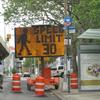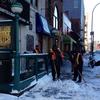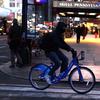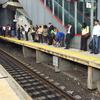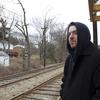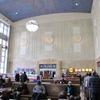Transportation Nation appears in the following:
Over 4,800 Drivers Caught Speeding in NYC -- In Two Days
Friday, May 23, 2014
A two-day crackdown on speeding in New York City has resulted in nearly five thousand tickets for drivers.
See the San Francisco Bay Bridge Being Dismantled, Piece by Piece
Monday, May 12, 2014
How do you take down a 77-year old bridge without using explosives? The same way it was built -- only this time, in reverse order.
VIDEO: Cute Kids, Catchy Music Push City's Traffic Safety Plan
Wednesday, May 07, 2014
This is kind of...strangely irresistible. New York City pushes traffic safety with an Aerosmith-inspired rap. All in a day's work for Mayor Bill de Blasio's Vision Zero.
Here's The Latest on Your Snow Commute
Monday, February 03, 2014
Funny how last week's headline works today. It's not deja vu. It's snowing again, and two more storms are approaching.
Why New Yorkers Suffer More in the Cold
Wednesday, January 29, 2014

The high temperature in St. Paul, Minnesota Monday was minus seven. And, we're talking real temperature, not wind chill. But, guess what, New Yorkers do suffer more in the cold. Here's why.
Citi Bike: Despite Bixi Bankruptcy, We're Fine
Tuesday, January 21, 2014

A Citi Bike spokeswoman says the declaration of bankruptcy by a corporate cousin of the company operating New York's bike share won't affect the system.
The Boss Sings About The George Washington Bridge
Wednesday, January 15, 2014

Maybe the most love a transpo/traffic meme has ever gotten from a mega-star. On late-night, Jimmy Fallon and Bruce Springsteen sing about the Fort Lee traffic jam, to the tune of "Born to Run."
Here's The Latest on Your Snow Commute
Thursday, January 02, 2014

What you need to know to get around the region Friday. And by the way, Mayor Bil de Blasio and Sanitation Commissioner John Doherty warn: stay inside. It will be COLD. And with windy conditions and cold, dry snow, even plowed streets can get covered up soon. Governor Chris Christie is agreeing. He's declared a state of emergency, and is "encouraging all New Jerseyans to stay off the roads if possible."
"Disorienting" Photos Spruce Up Subway Stop
Wednesday, December 11, 2013

Straphangers passing through the Bowling Green subway station may be made dizzy by an array of back-lit photos that look straight down on Manhattan intersections.
FAA: You Can Keep Your Smartphone On During Takeoff & Landing
Thursday, October 31, 2013
The FAA today said today that passengers can keep their electronic devices on during take off and landing.
Private Tech Buses Change San Francisco Neighborhoods
Monday, October 21, 2013

On weekday mornings, tech workers line up at the bus stops on in San Francisco's Mission District to wait for the free private shuttles that bring them to work in Silicon Valley. Corporate transit is nothing new, but the volume of people using it is, and San Francisco neighborhoods are starting to feel the change.
Metro North Riders: Here's What You Need to Know
Friday, September 27, 2013

Metro North, the nation's largest commuter railroad, is still hobbling along after an electrical failure knocked out the majority of service. The MTA says there there will be reduced service over the weekend, as follows:
The Passenger Train, Oldest New Trend in Orlando Transportation?
Friday, July 12, 2013
A commuter train between South Florida and Orlando is in the final planning stages and it may change transportation in Central Florida as we know it.
Chicago Bike Share Also Hitting Snags
Wednesday, June 12, 2013
(Tim Akimoff, WBEZ) This summer was supposed to be the summer of the giant bike share launches. New York's started on Memorial Day, but with lots of bugs. Now Chicago's is being delayed, by two weeks.
The Pittsburgh Area Has Light Rail — But Can You Find It?
Wednesday, May 01, 2013
Step one: try to find a Pittsburgh light rail station. Step two: now to try get to it by foot. Good luck with that!
Three New York Area Bridges to get Massive Overhaul
Wednesday, April 24, 2013
Does Classical Music at Train Stations Really Deter Crime?
Tuesday, April 09, 2013
(Brian Wise - WQXR) Move along, hoodlums. Antonio Vivaldi is playing at Newark Penn Station.
When New Jersey Transit upgraded the public address system at its Newark transit hub a year ago, they began piping in classical music along with the announcements on train arrivals and connections. The authority subscribed to a music service and station agents could select from different channels, which also include easy-listening and jazz.
The idea, said a NJ Transit spokesperson, is to relax customers "and make it more pleasant to traverse the facilities."
But in cities from Atlanta to Minneapolis and London, there's often a bigger strategy at work: turn on the great composers and turn away the loiterers, vagrants and troublemakers who are drawn to bus stations, malls and parking lots. Last month, the Associated Press reported on a YMCA in Columbus, OH that began piping Vivaldi into its parking lot, and claiming to disperse petty drug dealers as a result.
In the above podcast, WQXR host Naomi Lewin asks why classical music in particular seems to be the weapon of choice – and whether it works.
"It's been used as part of a larger strategy of crime prevention through environmental design," said Jacqueline Helfgott, chair of the criminal-justice department at Seattle University. She noted that classical music is often accompanied by upgrades like better lighting, improved traffic flow or trimmed shrubbery in public areas.
Studies on the specific effects of music on criminal behavior are lacking. But Helfgott believes classical music is historically associated with "a cultural aesthetic that is pro-social as opposed to antisocial," making it a preferred crime prevention tool.
Put another way, rowdy teenagers don't find classical very cool.
Nigel Rodgers, the head of Pipedown, a group that campaigns against background music in any form, believes the strategy presents a slippery slope. “Yes, young people commit crimes and it’s a problem," he said. "I do appreciate that. But we must seek out other pro-sociable ways of dealing with the problem rather than just squirt acoustic insecticide at young people.
"People who really like music of any sort don’t want to have it piped at them when they’re trying to talk, eat or shop when they don’t want it."
It's also worth keeping in mind that not all classical music works as a soothing agent. As anyone who has seen "A Clockwork Orange," knows, even Beethoven's Ninth Symphony has its dark associations.
In Columbus, OH, where the YMCA piped in Vivaldi, the strategy is being hailed as a success. A local business improvement district executive told the AP: "There's something about baroque music that macho wannabe-gangster types hate. At the very least, it has a calming effect."
Should classical music be used to fight crime and loitering? Join the discussion at WQXR.
The Tradition Of Naming Tunneling Machines
Thursday, April 04, 2013
Bertha, on board the Fairpartner, in Elliot Bay (photo by Bow Jones)
(Derek Wang - Seattle, KUOW) Bertha is here. The world’s largest tunnel boring machine arrived in Seattle Tuesday after being shipped from Japan. It’s expected to reach land sometime this week. After that, in a few months, it will get to work drilling the tunnel that will replace the Alaskan Way Viaduct.
The Washington State Department of Transportation named the machine, Bertha, after Seattle’s first female mayor, Bertha Knight Landes. The name was suggested by two school kids who won WSDOT’s naming contest.
According to Linea Laird, WSDOT’s tunnel project administrator, the tradition and practice of naming tunneling machines dates back to the earliest mining traditions.
“Originally, it was part of the patron saints of protection of underground workers,” she said. “There would be even a little shrine that would be established there for the workers.”
Laird says the name of the saint gave the miners something personal that they could relate to as they did their dangerous work. Paying homage to their saints evolved into naming tunneling machines.
Naming is commonplace in the tunneling industry these days. Miami named its machine after Harriet Tubman. And Sound Transit named two machines Balto and Togo, after two famous Husky dogs that inspired the Iditarod. And the tunneling machines boring new subway tunnels under the streets of New York City bear a variety of names, including Molina, Georgina, and TESS.
Chris Dixon is supervising the contractors who will be operating Bertha. He’s been in the tunneling business for decades.
“There were two machines that drove tunnels on one contract on the Los Angeles Metro Red Line subway, they called them Thelma and Louise.” Dixon says another machine used in Puerto Rico was named after the wife of a contracting executive.
Laird concedes that the name Bertha might not be the prettiest. But she says the name conjures up something that is big, solid and has a down-home quality to it. That, Laird says, seems like an appropriate description of Bertha’s new home: Seattle.
Here's WSDOT's map of places to go to get a good look at Bertha.
One Train Ticket in New Jersey Can be Valid for Years ... If You Never Get on a Train
Wednesday, April 03, 2013
The main waiting room at Newark Penn Station (photo by Luke H. Gordon via flickr)
(Sarah Gonzalez - WNYC/NJPR) John Williams says he’s been living at Newark Penn Station for a couple months.
His nails are almost an inch long; his grey beard less groomed than he’d like. But the 60-year-old is dressed sharp in a light brown plaid suit.
“I done had it on for two months,” he said. “I don’t smell and stuff like that but that’s a problem, you got some people in here that really, really smell bad.”
Laws prevent transit police from asking anyone – including the homeless – to leave stations unless they’re breaking rules.
“We can sleep sitting up in here, but if you lay down in here they’re going to wake you,” Williams said. “They take a stick and stick you with it. Or hit on the side of the wall or the bench.”
Inspector Al Stiehler with NJ Transit Police says managing the homeless in train stations takes officers are away from their primary role, which is counter-terrorism and safety.
“Sometimes we’re dealing with the same person two, three times a day,” Stielher said. “They’re intoxicated, they go to the hospital, they come right back. They have a seizure, they go to the hospital, they come right back. Police officers didn’t have the tools to do what they needed. It was just a cycle.”
(photo by Laser Burners via flickr)
Since New Jersey Transit can't ask homeless people to leave the waiting areas, they’re trying to offer help instead.
Michelle Walsh is the Community Intervention Specialist with New Jersey Transit. She tries to get the homeless into shelters and connect them to programs that offer food and services. She says the program has two goals.
“Helping the homeless but also making it more comfortable for passengers when they’re riding through,” she said.
Walsh says she engages about 75 percent of the homeless in some way.
“Even if it looks like someone isn’t working with me, we might be working on… getting their birth certificate from a different state which takes time.”
Many of the homeless men and women have mental disorders, Walsh said. Many want to stay at train stations.
And they have the right to be there, according to Ed Barocas, the legal director for the American Civil Liberties Union in New Jersey.
“If someone is simply sitting up on a bench, whether they do it for a half hour or 4 hours that’s their right to do it,” Barocas said. “These are areas open to the public, and people who are homeless are a part of the public.”
The U.S. Department of Housing and Urban Development has given the state $24 million dollars to help with the homeless. And some of that money will go to organizations that New Jersey Transit partners with.
Buying a Ticket to Sleep on the Benches
John Williams says he prefers to stay at train stations where there are a lot of other homeless people – like a station in Summit. He says it makes him feel more comfortable.
And if he wants to sit, or rest his eyes, on the benches for ticketed passengers only, he knows what he needs to do.
“I have a ticket, okay. This is what you need to have to stay in,” Williams says. “If you doesn’t have that you’re going to have to go out in the cold.”
He doesn’t need to buy a train ticket every night in order to sleep on the benches.
“No I don’t buy a ticket every night. I buy a ticket one time, as long as it’s not punched it’s good. As long as it doesn’t have a hole in it. I done had this for two months.”
Once you’re on a train, conductors, which cost taxpayers about 30 million dollars a year, come by with a hole-puncher, manually punching two holes in every passenger’s ticket.
If you never get on a train to get your ticket punched, your ticket will never expire.
Some of the homeless people at Newark Penn Station have been there for years. One has been at the station for 19 years; another for 26 years.
Inspector Al Stiehler says NJ Transit has been tossing around ideas to create a system where tickets would eventually expire, but he says that’s way down the line.
He says train stations attract large homeless populations because they offer amenities the homeless can’t get elsewhere.
“They have access to liquor stores and bars, there’s people around here that can get money, there’s food, and they have 24/7 hour police protection. They’re not going to get that at a shelter.”
John Williams says he shouldn’t have to go to a shelter.
“Because I am a taxpayer,” he said. “Well, I used to be a taxpayer.”
Seattle Could Cancel Nearly 30 Percent Of Bus Routes
Tuesday, April 02, 2013
Seattle bus (photo by Oran Viricincy via flickr)
(Derek Wang - Seattle, KUOW) King County Metro could eliminate of almost a third of its routes.
Ongoing budget woes are forcing the Seattle transit provider to consider slashing its bus service. Metro is grappling with less sales tax revenue and it’s anticipating the end of a temporary funding source.
On Monday, the agency released a first draft of possible reductions, which could include canceling 65 routes and reducing service on 86 others.
Metro General Manager Kevin Desmond predicted an unpleasant ride. “Those routes are going to be more crowded,” he said. “You may not be on a route now that may be targeted for reduction, but more people may be needing to access your route and therefore that route is going to become more crowded.”
Another thing that could become more crowded: the street. Metro says fewer people would take the bus if the cuts go into effect. The agency predicts that could lead to as many as 30,000 additional cars on the road every day.
Metro says it will continue to look for ways to reduce costs. Desmond adds that Metro has raised fares already--four times since 2000.
The cuts are far from certain. King County Executive Dow Constantine and Seattle Mayor Mike McGinn have asked state lawmakers to come up with new funding sources for Metro. Those sources could be part of a gas tax increase, or a new vehicle tax that would be based on the value of a driver's car.
